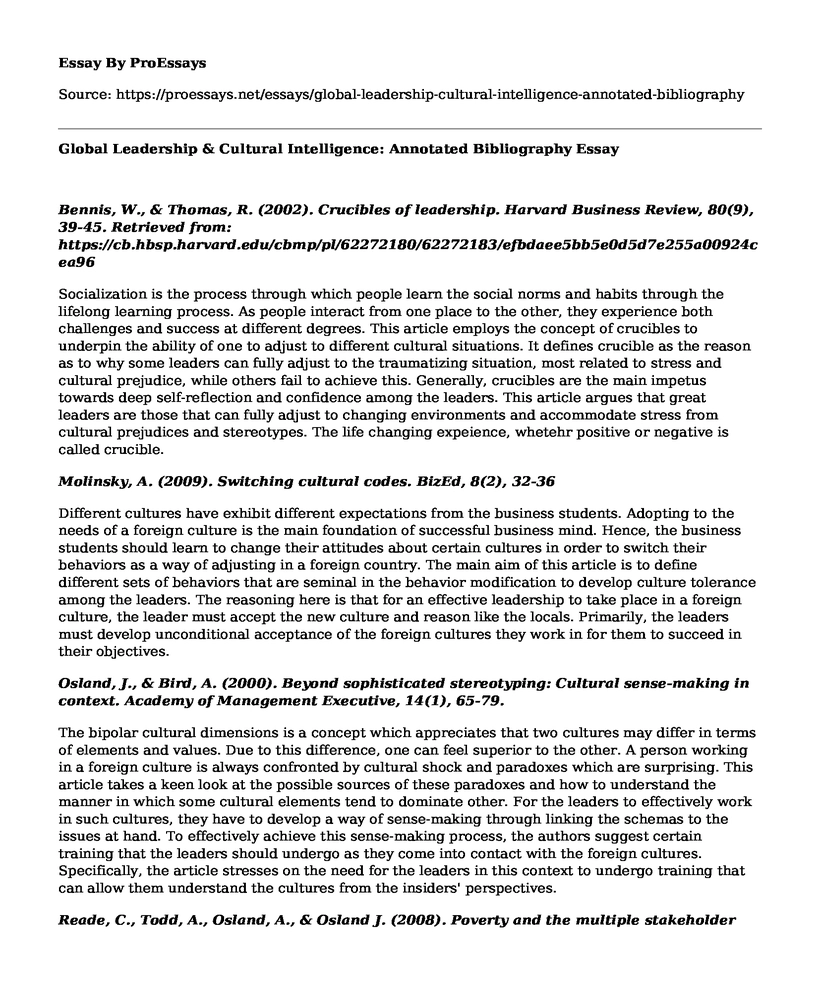Bennis, W., & Thomas, R. (2002). Crucibles of leadership. Harvard Business Review, 80(9), 39-45. Retrieved from: https://cb.hbsp.harvard.edu/cbmp/pl/62272180/62272183/efbdaee5bb5e0d5d7e255a00924cea96
Socialization is the process through which people learn the social norms and habits through the lifelong learning process. As people interact from one place to the other, they experience both challenges and success at different degrees. This article employs the concept of crucibles to underpin the ability of one to adjust to different cultural situations. It defines crucible as the reason as to why some leaders can fully adjust to the traumatizing situation, most related to stress and cultural prejudice, while others fail to achieve this. Generally, crucibles are the main impetus towards deep self-reflection and confidence among the leaders. This article argues that great leaders are those that can fully adjust to changing environments and accommodate stress from cultural prejudices and stereotypes. The life changing expeience, whetehr positive or negative is called crucible.
Molinsky, A. (2009). Switching cultural codes. BizEd, 8(2), 32-36
Different cultures have exhibit different expectations from the business students. Adopting to the needs of a foreign culture is the main foundation of successful business mind. Hence, the business students should learn to change their attitudes about certain cultures in order to switch their behaviors as a way of adjusting in a foreign country. The main aim of this article is to define different sets of behaviors that are seminal in the behavior modification to develop culture tolerance among the leaders. The reasoning here is that for an effective leadership to take place in a foreign culture, the leader must accept the new culture and reason like the locals. Primarily, the leaders must develop unconditional acceptance of the foreign cultures they work in for them to succeed in their objectives.
Osland, J., & Bird, A. (2000). Beyond sophisticated stereotyping: Cultural sense-making in context. Academy of Management Executive, 14(1), 65-79.
The bipolar cultural dimensions is a concept which appreciates that two cultures may differ in terms of elements and values. Due to this difference, one can feel superior to the other. A person working in a foreign culture is always confronted by cultural shock and paradoxes which are surprising. This article takes a keen look at the possible sources of these paradoxes and how to understand the manner in which some cultural elements tend to dominate other. For the leaders to effectively work in such cultures, they have to develop a way of sense-making through linking the schemas to the issues at hand. To effectively achieve this sense-making process, the authors suggest certain training that the leaders should undergo as they come into contact with the foreign cultures. Specifically, the article stresses on the need for the leaders in this context to undergo training that can allow them understand the cultures from the insiders' perspectives.
Reade, C., Todd, A., Osland, A., & Osland J. (2008). Poverty and the multiple stakeholder challenge for global leaders. Journal of Management Education, 32(6), 820-8 40
There are different global challenges which require objective leadership and focusses attention. This article appreciates the role of different stakeholders in combating poverty as a global challenge. Among the stakeholders mentioned in this project are the multinational corporations, the global leaders the non-governmental organizations among others. Stakeholder dialogue is the process through which the parties involved in combating poverty as a global problem discuss about the issue to come up with a recommendation.
Bird, A., & Osland, J. S. (2005). Making sense of intercultural collaboration. International Studies of Management & Organization, 35(4), 115-132.
The increased effects of globalization means increased interaction between different cultures. This warrants the need for business people across the globe to appreciate the different cultures which they encounter in the course of their business. This article articulates some of the approaches that are important in achieving intercultural sense-making among the stakeholders from different regions. This includes some of the best methods of communication that the involved parties can adopt to promote cultural diversity and tolerance in business scenarios. By so doing, the involved parties can be able to understand some of the barriers to trust as a result of cultural difference.
Cite this page
Global Leadership & Cultural Intelligence: Annotated Bibliography. (2022, May 12). Retrieved from https://proessays.net/essays/global-leadership-cultural-intelligence-annotated-bibliography
If you are the original author of this essay and no longer wish to have it published on the ProEssays website, please click below to request its removal:
- Competitor Service Area Analysis
- Research Paper on Bounded Rationality in Financing
- Assignment Example on Organization's Culture and Ethical Viewpoints
- Essay Sample on Purpose of Leaders
- Good Governance: A Case Study of Uganda - Essay Sample
- Essay Example on Competing Theories of Decision-Making: Plato vs Sun Tzu
- Paper Example on Nike: A Global Powerhouse in Sportswear Since 1964







